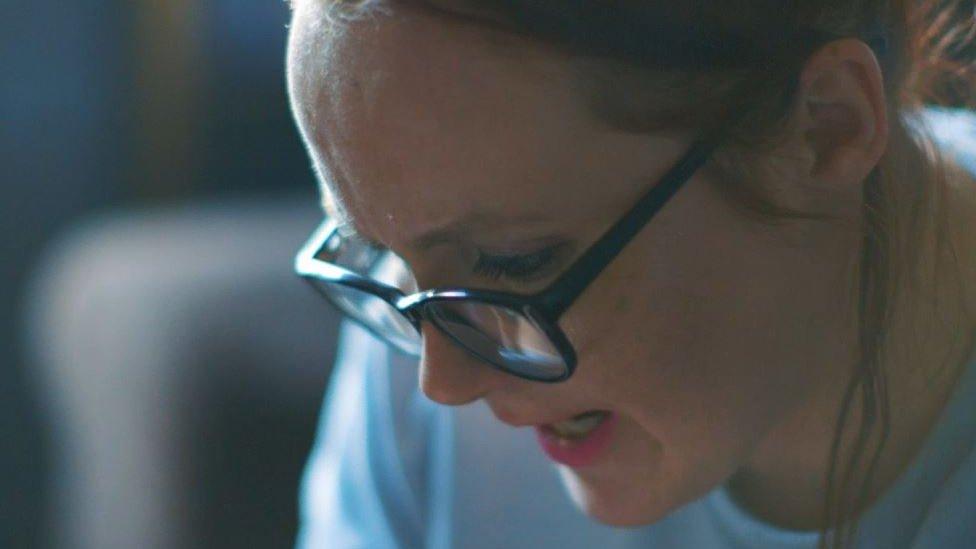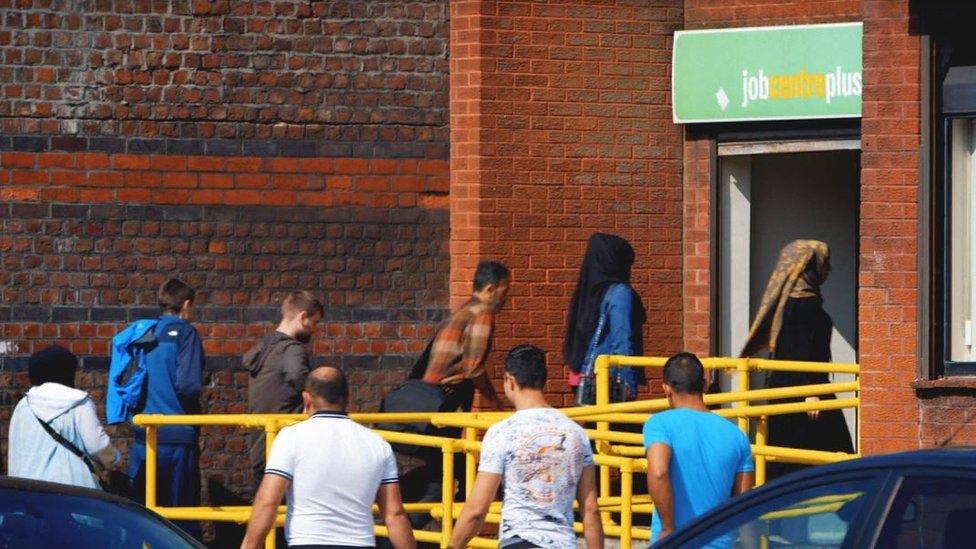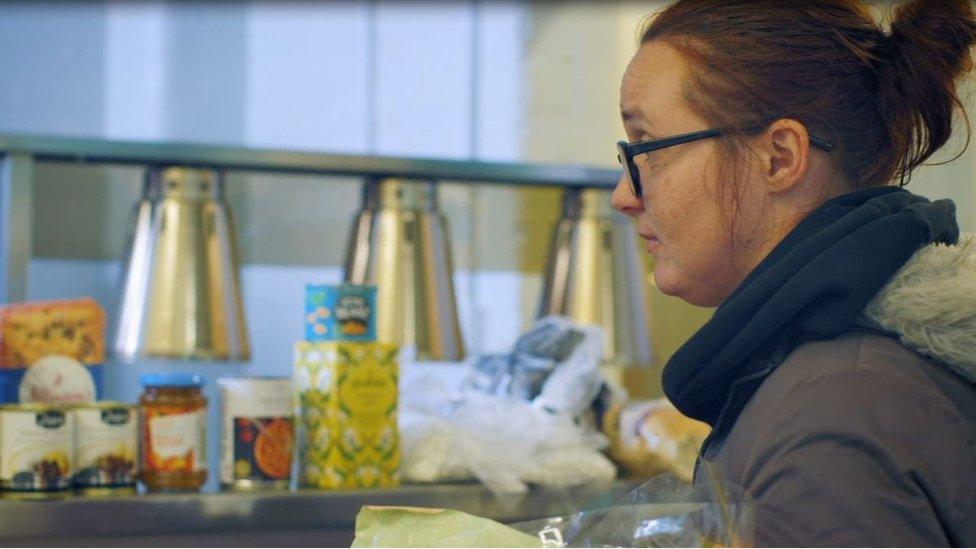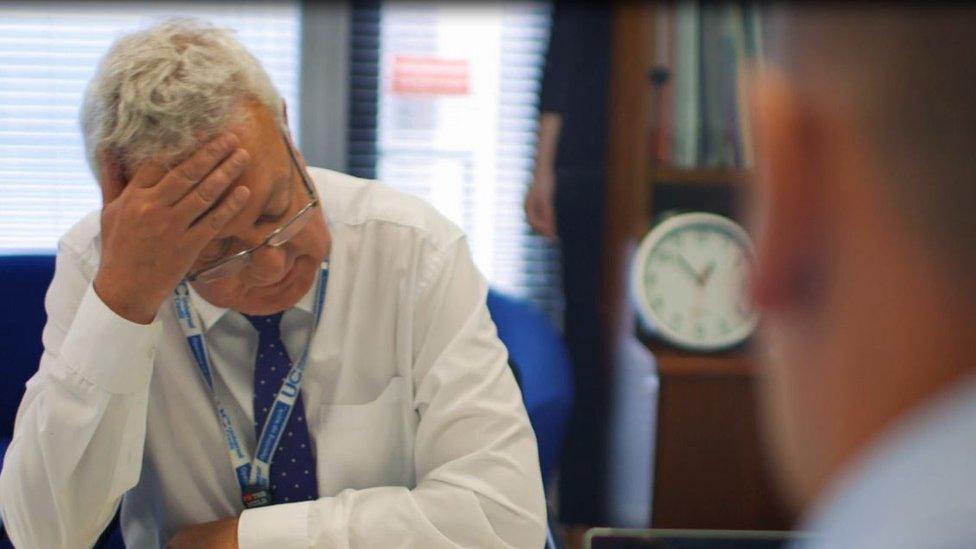Universal credit rollout delayed again - to 2024
- Published

Stories like Paula's, whose first universal credit payment wasn't enough to live on, are thought to have "scared people"
Full rollout of universal credit, the government's flagship welfare reform, is being delayed again, adding £500m to its overall cost, the BBC has learned.
Officials say not enough people are moving to the benefit as they are "scared" to move to universal credit.
The system was meant to be fully live by April 2017, but the new delay will push it back to September 2024.
The welfare delivery minister, Will Quince, said claimants would not lose money as a result of the change.
The backroom discussions leading to the latest delay were recorded by a BBC team whose series, Universal Credit: Inside the Welfare State, starts on Tuesday.
The new benefit, which replaces six existing payments, has been beset by problems, with claimants having to wait at least five weeks for the payments to start and many reports of people falling into debt, and having to resort to food banks as a consequence.

People transferring to universal credit have to wait five weeks for the first payment
On top of that, advance payments of the benefit, introduced to help people through the five weeks with no money coming in, have been blamed for putting claimants into debt. That's because once the benefit finally comes through, payments are reduced to pay off the advance.
Changing circumstances
Claimants are meant to transfer onto universal credit when they have a change of circumstances, such as moving in with a new partner.
The film-makers were allowed access to meetings inside the Department for Work and Pensions, and officials are seen pondering what to do when they realise fewer people are reporting changes of circumstances and therefore being transferred to the new benefit, than expected.
One programme shows Bolton mum Paula struggling to feed her family when her first universal credit payment comes in at just over £500 for a month, because of deductions to pay off the advance she took during the five-week wait.
She ends up resorting to a food bank. "I have just got myself into one big mess and I have lost control over everything," Paula tells a debt counsellor.
"I am in debt up to my eyeballs and it's not going to go away."

Paula was referred to a food bank
The counsellor tells her: "Any customer on universal credit, we already know that you're standing on the back foot.
"If you don't have money saved up already or you don't have backup of family who can support you, you will fall into taking an advance payment."
She added that benefit deductions to pay off the advance, leave people "constantly trying to catch up".
'Scared'
Neil Couling, the senior civil servant in charge of the rollout for the past five years, is filmed telling a Whitehall meeting: "We've got a lot of anecdotal evidence of people being scared to come to universal credit.
"It's a potentially serious issue for us, in terms of completing the project by December 2023, but I'm urging people not to panic."

"I'll take the beating": senior civil servant Neil Couling decides to delay full rollout by another nine months
But a few weeks later, in September 2019, he decides to delay full rollout to September 2024, putting £500m on the bill.
"Three, six or nine months, it doesn't matter - the headline will be: 'Delay, disaster'," he says
"I would say, 'Go safe, put the claimants first, and I'll take the beating.'"
'Hugely embarrassing'
Despite the problems, Mr Couling says he believes that once universal credit is fully implemented, it will be successful and regarded as "the right thing to do".
"This is the system that will form the bedrock of social security for the next 30 years."
He expects universal credit to continue to grow, with 2.6 million people already on it by September last year: "Right now there's no way I can put the brakes on and stop.
"I have to keep going to the destination or you have to set me a different destination, because there's 2.6 million people, and if we get something wrong we could disrupt their lives and they've got no alternative. There's no alternative bank they can go to get help. We are the payer of last resort."
Labour's shadow work and pensions secretary, Margaret Greenwood, called the news "hugely embarrassing" for the government and called for universal credit to be scrapped.
"Universal credit was supposed to be its flagship social security programme.
"Instead we now find that it is being forced to delay the full rollout because the public have so very little faith in it and many are actually afraid of it," said Ms Greenwood.
The government says universal credit was always intended to be introduced slowly.
It is "the biggest change to the welfare system in a generation, bringing together six overlapping benefits into one monthly payment and offering support to some of the most vulnerable people in society", said Mr Quince.
"It is right that we revisit our forecasts and plan, and re-plan accordingly, ensuring that the process is working well for people on benefits."